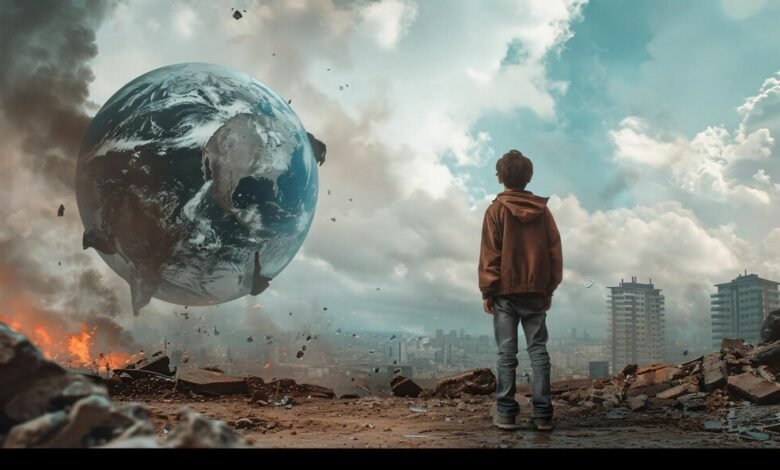Understanding the Facing the New World Apocalypse -Death March-

The “new world apocalypse -death march-” is a powerful phrase that captures the fears and challenges we face in today’s world. Many people feel overwhelmed by the changes happening around them, like climate change, war, and health crises. These events can feel like a death march, leading us into an uncertain future.
In this blog post, we will explore what this death march means for our lives and our planet. We will discuss how history and our current situation shape our understanding of an apocalypse. By looking at these issues, we can find ways to cope and hope for a better tomorrow.
What Does “New World Apocalypse -Death March-” Mean
The phrase “new world apocalypse -death march-” describes a feeling many people have today. It suggests a time when our world seems to be falling apart. Events like climate change, wars, and health crises make it feel like we are on a path leading to disaster. This feeling can be scary, and it often leads to anxiety about the future.
Key Points:
- Feeling Overwhelmed: Many people feel lost in today’s fast-changing world.
- Changes Around Us: We see news about natural disasters, conflicts, and more.
- Need for Understanding: It is essential to understand what these events mean for us.
The Historical Context of Apocalyptic Events

History is full of apocalyptic events that have changed the world. From wars to natural disasters, people have often faced dire situations. Understanding these events helps us see how our current problems connect to the past. For example, past wars have caused suffering and trauma. Today, these feelings resurface as we deal with modern crises.
Important Historical Events:
- World Wars: Huge conflicts that changed nations.
- Natural Disasters: Earthquakes and floods that caused great loss.
- Pandemics: Disease outbreaks that affected millions of lives.
Understanding Collective Trauma in Today’s Society
Many of us share feelings of fear and sadness about the world. This is called collective trauma. It happens when large groups of people experience painful events together. We might see this in how communities react to disasters or wars. Talking about our feelings can help heal this trauma and create hope for a better future.
Ways to Cope with Collective Trauma:
- Share Your Feelings: Talk to friends or family about your worries.
- Listen to Others: Hearing other people’s stories can help.
- Find Support: Join groups that help you feel understood.
How Climate Change Feels Like a Death March
Climate change is a significant issue we face today. It affects the weather, the oceans, and our way of life. Many people feel that the changes in our environment lead us toward a dangerous path. It can feel like a death march, where we march towards an uncertain future without a clear way out.
Signs of Climate Change:
- Extreme Weather: More storms, heatwaves, and floods.
- Loss of Wildlife: Many animals are losing their homes.
- Rising Sea Levels: Coastal areas are at risk of flooding.
Building a Community to Overcome the Death March

Communities can come together to help each other through tough times. When we support one another, we can face the challenges of the “new world apocalypse -death march-.” Working together allows us to share ideas and solutions for a better future. We can create strong bonds that help us feel less alone.
How to Build a Strong Community:
- Organize Events: Gather people for activities that build connections.
- Share Resources: Help others by sharing food, clothes, or knowledge.
- Encourage Each Other: Support your neighbors and friends in tough times.
Conclusion
In the “new world apocalypse -death march-” is a scary idea, but we can face it together. Understanding our fears and talking about them helps us feel better. By learning from history, we can avoid making the same mistakes. It’s important to remember that while the world may seem tough, there is still hope for a brighter future.
We can also build strong communities where everyone supports each other. Working together makes us stronger and helps us find solutions to our problems. So, let’s keep talking, sharing, and caring for one another. Together, we can make the world a better place, even in difficult times.
FAQs
Q: What does “new world apocalypse -death march-” mean?
A: It describes the feeling that our world is facing many problems, leading us toward a dangerous future.
Q: How does history relate to our current challenges?
A: History shows us past events that caused suffering, helping us understand and learn from our mistakes today.
Q: What is collective trauma?
A: Collective trauma is when a large group of people shares painful experiences, like disasters or wars, which can affect everyone’s feelings.
Q: How can communities help during tough times?
A: Communities can support each other by sharing resources, organizing events, and encouraging one another through challenges.
Q: What can individuals do to cope with their fears?
A: Individuals can talk about their feelings, listen to others, and seek support from friends, family, or community groups.



